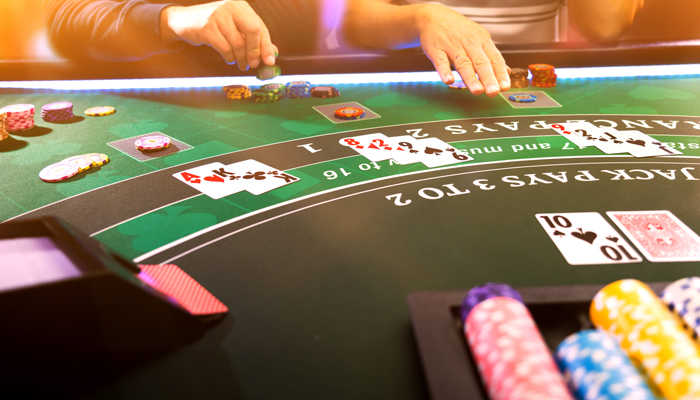A Simple Blackjack For Beginners Strategy
 A Quick Guide to Blackjack For Beginners
A Quick Guide to Blackjack For Beginners
Don’t overthink it. Blackjack is a great game. And just because you’ve never played or feel intimidated by all the rules shouldn’t stop you from learning how to play one of the funnest games in the house.
The dealers are there to help you, and we’ve got a fun little guide to lay out the basics, so what are you waiting for? Let’s learn the rules for blackjack for beginners.
A Guide to Blackjack For Beginners
We will walk you through the basic rules, how to buy in, and what you should be looking for in a table as a beginner. We will talk about the basic strategy for the usual rule set found in both brick-and-mortar casinos and online casinos.
We will cover some basic tips, how and where to practice, and what you should be thinking about when it finally comes time to play blackjack for real money. But most of all, we will calm your anxiety and make sure you are ready to get out there and play some blackjack for beginners.
- 🃁 Blackjack for Beginners: Rules of the Game
- 🃁 Beginner Blackjack Basic Stratgey Guide
- 🃁 Helpful Blackjack Tips For Beginners
- 🃁 Conclusion
Blackjack For Beginners: Rules of the Game
Many slot players and even some table game players seem put off by the many perceived rules of blackjack. And while there are some rules you don’t see in other table games, they are not difficult or complicated to learn.
You can learn everything you need to know in less than five minutes, and every dealer at any table is always happy to help, or you can simply follow our simple blackjack for beginners’ guide. Either way, we will have you up and playing blackjack like a pro in absolutely no time.
Let’s take a quick minute to discuss how blackjack works. We want to get as close as possible to 21 without going over while still having a higher point total than the dealer. All cards have the point value printed on them, except face cards, which are worth ten, and oddly, an ace can be worth either one or eleven.
A blackjack is any first two cards that equal 21, basically an ace and a face. This should get you paid 3 to 2 on your bet. If the dealer has a blackjack, they win, and no more cards are drawn.
The dealer will deal everyone two cards, and they will also receive two cards. They will turn one of those face up. It’s important to remember that dealers have strict rules on when they hit and when they stand. Dealers will always hit to 17 and then stand on anything 17 and up. Sometimes, when they have just an ace and a six, they need to hit, which is called soft 17, depending on the house rules. If they hit a 17, don’t panic.
Once we have our heads wrapped around those simple rules, we need to talk about buying in. Make sure to look at the table minimums; they will be clearly posted. As we are just starting out, it’s probably best to stick with the lowest minimums you can find.
Explain to the dealer that you are new and set your money in front of you halfway between you and the dealer. They don’t need to reach out to get it; you don’t need to go into their dealing area. They will hand you chips. Check how much they are worth, and then make the minimum bet accordingly. Once you’ve been dealt your cards, you can use our beginners’ guide to blackjack to help you figure out how to play your hand.
Beginner Blackjack Basic Strategy Guide
Our beginner guide to blackjack strategy begins with the dealer’s up card. We will make our decision to hit or stand based not only on our first two cards but also on the dealer’s hand. For starters, if we have blackjack, we are getting paid, and the dealer will pick up our hand. No decision needs to be made.
We will stand if we have a 17, 18, 19, or twenty. The one difference is that of the ace and six or seven. This is that soft seventeen we talked about. We will hit that against a two and double it against a 3 through 6. If you have an ace and a seven, we will double that against a two through six. Double means we will match our initial bet, doubling our total wager. Simply put your money out beside your original bet, NOT ON TOP OF IT, and tell the dealer you wish to double.
Now, if the dealer has a two through six card up, this is called a breaking hand. You should not hit anything over twelve because you might bust, and we want the dealer to bust. We will first look and see if we have any of the soft hands — hands with an ace, which is counted as 11, and that doesn’t break our hand.
If we have an ace and a two or three, we should hit against a dealer two, three, or four and double against a five or six. If we have an ace and a three, we should double against four, five, or six and hit against the two or three. And with an ace and a four, we should double against the three, four, five, or six and hit against the dealer two. We should hit any other dealer card higher than a six.
The next thing we should look at is splitting. If our first two cards are the same value, we can split them. This goes for tens as well, but don’t. We will always split pairs of aces and eights. We split nines against a dealer two through nine, except when they have a seven. We never split tens. Sevens are a split against a dealer two through seven up card.
Sixes are split against a two through six; we never split fives, though we may double. Fours are split against only a five or six. If you have a pair of twos or threes, you should split against a dealer two through seven.
The next thing we need to look at is whether we have a total of nine, ten, or eleven in our first two cards. If we do, we may wish to double as we did with soft hands earlier. If we have eleven, we should always double. If we have ten, we double against anything but a dealer ace or ten. If we only have nine, we should only double against three through six.
Now that we have the double-down and splits out of the way let’s talk about what we need to hit. As we mentioned, if the dealer has two through six, and we aren’t going to split or double, and our hand is over twelve, we should stay. If we have precisely twelve, we should hit against two or three; otherwise, we should stay.
If the dealer has a seven-through ace-up card and our hand doesn’t fall under any of the other examples we’ve discussed, we need to hit until we at least have 17. Once there, you can stand.
It seems a little complicated, but once you play a little bit and look over our blackjack tips for beginners section below, you will have the hang of it in less than ten minutes.
Helpful Blackjack Tips For Beginners
If you would like to get the most out of your first few attempts at blackjack, here are some of the top tips for getting ready, finding the right tables, and playing the best game you can.
Practice
Scores of sites on the Internet offer practice opportunities. Simply type in online blackjack for beginners, and you will find lots of websites you can play on for free or in demo mode. These websites will walk you through the game’s mechanics; some will even show you in real-time when you make a playing error. This kind of practice could save you hundreds on your next visit to the casino. There are online poker sites as well.
Strategy Cards
You can download and print strategy charts from these same websites, which give a graphical interpretation of how to play your hand. Since each hand has a mathematically correct way to be played, these cards can ensure that you always play each hand perfectly, keeping the house edge low.
Table Minimums
As we mentioned, in a brick-and-mortar casino, it’s important to note the table minimums and keep them low. If you are fortunate enough to live in or be traveling to one of the seven states where you can play blackjack online legally for real money, you’re in even better luck as you can often find blackjack games to learn on for as low as 25 cents or play on live dealer blackjack games with real dealers to help teach you for just a $1. Here is an excellent list of places to play real money blackjack.
Friendly Dealers and Players
If you are in a brick-and-mortar casino, look for a table with the right ambiance for your first few times. A bright and chipper dealer, a friendly group of players, nobody trying to tell you how to play, no drunks, and no negative nellies. We are trying to learn, and even more importantly, we are trying to have fun, so pick your table carefully — don’t just sit down at the first one you see.
Player Friendly Rules
Just like potato chip bags getting smaller, recent inflationary pressures have caused a spate of rule changes that hurt the small-time recreational blackjack player. Do not play on tables that only pay 6 dollars for every 5 dollars you bet. Do not play at tables that do not allow you to double after the split. Don’t play at tables that don’t use discard racks but employ a continuous shuffling machine, where the cards are placed right back into the machine to be dealt again.
Side Bets
For the most part, the side bets are high house edge sucker bets meant to separate you from your hard-earned money. If you want to play them, keep your bets low and bet them sparingly. Insurance, which is offered whenever the dealer has an ace up, is a fine example. Never take insurance, and stay far away from the even money bet, no matter what your cousin from Jersey City tells you about it being a sure thing. The odds against you are terrible.
Conclusion
Learning blackjack for beginners is all about practicing a bit, using your basic strategy card to make sure you play each hand correctly, and having a little patience until it all makes sense. Pretty soon, it will be second nature. Also, don’t forget our blackjack tips for beginners and beginners blackjack basic strategy advice. It will help you get a solid footing on your next blackjack adventure and hopefully save you a few bucks in the process.




